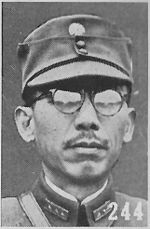About Tang Shengzhi
- Tang Shengzhi (Chinese: ???; pinyin: Táng Shengzhì; Wade-Giles: Tang Sheng-chih; 12 October 1889 – 6 April 1970) was a Chinese warlord during the Warlord Era, a military commander during the Second Sino-Japanese War and a politician after World War II.
- After participating in the Xinhai Revolution, Tang graduated from the Baoding Military Academy in 1914.
- He participated in the National Protection War and the Constitutional Protection Movement.
- Tang Shengzhi was appointed commander of the Hunan Fourth Division and came into conflict with the governor, Zhao Hengti.
- He was defeated and forced to withdraw from Changsha.
- He decided to join the Northern Expeditionary Army and was given command of the Eighth Army of the National Revolutionary Army.
- By 2 June 1926 his troops had reoccupied Changsha.
- On 11 March 1926 he became the military and civil governor of Hunan after the execution of the former provincial military commander, Li Youwen.
- While his military office ended 14 July 1926 once his province had been secured, he remained as civil governor until April 1927.
- Tang sided with Chiang Kai-shek and helped him to secure control of northern Beijing and the Tianjin region by removing Bai Chongxi, a Guangxi warlord who was in actual control of the region but ostensibly allied with Chiang Kai-shek.
- Later Tang commanded armies to fight other warlords for Chiang Kai-shek with great success.
- However, after these potential rivals were defeated, Chiang enraged Tang when he attempted to remove him and as a result, Tang defected to warlords in Guangxi and Guangdong to help them fight Chiang. During the Second Sino-Japanese War most warlords in China began to nominally unite against the Japanese invaders and Tang became an important member of Chiang Kai-shek's national defense committee.
- After repeated pleas from Chiang, Tang finally accepted the command of the Nanjing Garrison during the city's siege in December 1937 by the Japanese, and promised to fight the Japanese unto his death.
- (Note: There exists another claim.
- Some writers pointed out that it was Tang who volunteered to serve as the commander of the Nanjing garrison and promised to fight until his death without any pressure from Chiang Kai-Shek.
- Before 1937, Tang had served as a general under Chiang but without really much true power.
- It can be imagined that Chiang Kai-Shek appointed Tang as commander of the capital garrison only because there were not too many alternatives.
Read more at Wikipedia


 Date of Birth:
Date of Birth:  Place of Birth: Dong'an County, Hunan, China
Place of Birth: Dong'an County, Hunan, China